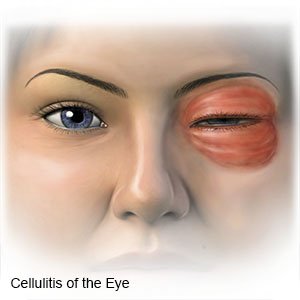Periorbital cellulitis is inflammation and infection of one or both eyelids caused by bacteria. Periorbital cellulitis is most common in children younger than 5 years old.
 |
DISCHARGE INSTRUCTIONS:
Call 911 for any of the following:
- Your child has trouble breathing.
- Your child has a seizure.
- Your child is more sleepy than usual or is hard to wake.
Return to the emergency department if:
- Your child says his or her neck feels stiff.
- Your child has a headache and is vomiting.
- Your child has blurred or double vision and cannot see well in bright light.
- Your child’s infected eye bulges from his or her head.
Contact your child’s healthcare provider if:
- Your child has a fever higher than 101.5°F (38.6°C) and chills.
- You see red streaks on the skin of the infected area.
- Your child’s eye is more red and swollen, or starts to drain pus.
- You have questions or concerns about your child’s condition or care.
Medicines:
Your child may need any of the following:
- Antibiotics help treat a bacterial infection.
- Acetaminophen decreases pain and fever. It is available without a doctor’s order. Ask how much to give your child and how often to give it. Follow directions. Acetaminophen can cause liver damage if not taken correctly.
- NSAIDs , such as ibuprofen, help decrease swelling, pain, and fever. This medicine is available with or without a doctor’s order. NSAIDs can cause stomach bleeding or kidney problems in certain people. If your child takes blood thinner medicine, always ask if NSAIDs are safe for him or her. Always read the medicine label and follow directions. Do not give these medicines to children under 6 months of age without direction from your child’s healthcare provider.
- Do not give aspirin to children under 18 years of age. Your child could develop Reye syndrome if he takes aspirin. Reye syndrome can cause life-threatening brain and liver damage. Check your child’s medicine labels for aspirin, salicylates, or oil of wintergreen.
- Give your child’s medicine as directed. Contact your child’s healthcare provider if you think the medicine is not working as expected. Tell him or her if your child is allergic to any medicine. Keep a current list of the medicines, vitamins, and herbs your child takes. Include the amounts, and when, how, and why they are taken. Bring the list or the medicines in their containers to follow-up visits. Carry your child’s medicine list with you in case of an emergency.
Prevent periorbital cellulitis:
- Have your child wear proper safety equipment. Protect his or her face from injury during sports and other activities.
- Keep wounds clean and dry. Clean wounds on the face with soap and water. Cover wounds with a dry bandage. Use antibiotic ointment on skin breaks to help prevent infection. Do not let your child swim with a skin wound.
- Ask your child’s healthcare provider about vaccines. The Hib and pneumococcal vaccines help prevent periorbital cellulitis.
Follow up with your child’s healthcare provider in 1 to 2 days:
Write down your questions so you remember to ask them during your visits.